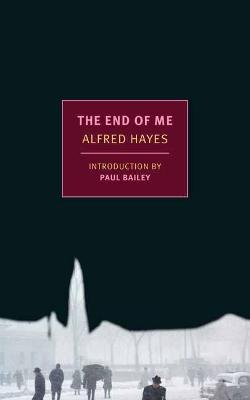
End of Me
(Paperback)
Publishing Details
End of Me
By (Author) Alfred Hayes
New York Review Books
NYRB Classics
26th May 2020
1st July 2020
United States
Classifications
General
Fiction
813.52
Physical Properties
Paperback
178
Width 127mm, Height 203mm
Description
A moving tale about middle age, divorce, modern love, and returning home by one of the great American storytellers. Asher's career as a Hollywood screenwriter has come to a humiliating end; so has his latest marriage. Returning to New York, where he grew up, he takes a room at a hotel and wonders what, well into middle age as he is, he should do next. It's not a question of money; it's a question of purpose, maybe of pride. In the company of an arch young poet, Michael, Asher revisits the streets and tenements of the Lower East Side where he spent his childhood, though little remains of THE past. Michael introduces him to Aurora, perhaps his girlfriend, who, to Asher's surprise, seems bent on pursuing him, too. Soon the older man and his edgy young companions are caught up in a slow, strange, almost ritualized dance of deceit and desire. The End of Me, a successor to In Love and Her Face for the World to See, can be seen as the final panel of a triptych in which Alfred Hayes anatomizes, with a cool precision and laconic lyricism that are all his own, the failure of modern love. The last scene is the starkest of all.
Reviews
"His novels perfectly capture the texture of midcentury American life. Theres nothing obsolete in Hayess writing. His work must come back to us in all its brutal honesty." Alex Harvey,Los Angeles Review of Books
"[Alfred Hayes] gives you an amazingly precise representation of what the world looks like if theres no love in it." Rachel Cusk
Along with the other parts of this loose trilogy, this elegant, oddly-gripping novel establishes Hayes as the even more disenchanted heir of F. Scott Fitzgerald. . . . The End Of Me is stingingly good. John Powers,NPRs Fresh Air
[T]he canny revivalists at New York Review Books. . . . have reissued a loosely defined trilogy of Hayes short, powerful, first-person novels about a young writer . . . The last of these, The End of Me, . . . is . . . the most evolved and personal of the set, an impressionistic reflection on what its like to go looking for who you were in the places where you used to live. . . . Giving yourself over to each brief, tortured and often beautifully written paragraph feels like watching someone wrestle with the unfortunate reality of himself. Scott Bradfield,The Los Angeles Times
"This authors is a truly formidable and terrifying talent. He has a merciless insight into human behaviour and he writes with extreme compression and great directness." Walter Allen,New Statesman
"What sets him apart . . . is his feeling for words and his sense of how to make them count." Malcolm Cowley,The New York Times
"In his own manner Alfred Hayes makes his every note ring clear and true." Saturday Review
"Alfred Hayes writes with grace and facility . . . A master of contemporary fiction." New York Herald Tribune Book Review
"One very quiet touch from Mr. Hayes can convey more pain than any quantity of huffing and puffing from more insistent but less accomplished writers." Times Literary Supplement
Author Bio
Alfred Hayes (1911-1985) was born into a Jewish family in Whitechapel, London, though his father, a barber, trained violinist, and sometime bookie, moved the family to New York when Hayes was three. After attending City College, Hayes worked as a reporter for the New York American and Daily Mirror and began to publish poetry, including "Joe Hill," about the legendary labor organizer, which was later set to music by the composer Earl Robinson and recorded by Joan Baez. During World War II Hayes was assigned to a special services unit in Italy; after the war he stayed on in Rome, where he contributed to the story development and scripts of several classic Italian neorealist films, including Roberto Rossellini's Pais (1946) and Vittorio De Sica's Bicycle Thieves (1948), and gathered material for two popular novels, All Thy Conquests (1946) and The Girl on the Via Flaminia (1949), the latter the basis for the 1953 film Act of Love, starring Kirk Douglas. In the late 1940s Hayes went to work in Hollywood, writing screenplays for Clash by Night, A Hatful of Rain, The Left Hand of God, Joy in the Morning, and Fritz Lang's Human Desire, as well as scripts for television. Hayes was the author of seven novels, a collection of stories, and three volumes of poetry. NYRB Classics publishes My Face for the World to See and In Love.
